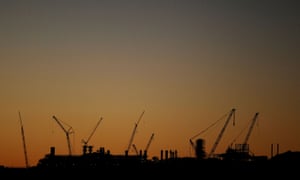Sinking billions of taxpayer dollars into gas would make Australia an international pariah (The Guardian, August 21 2020)
August 23, 2020
The Morrison governments post-Covid recovery commission has called for an astonishing level of support for a declining carbon fuel.

If environmentalists proposed a comparable guarantee to windfarms or industrial-scale solar or hydrogen, they would be hounded for blatant rent seeking. Photograph: Daniel Munoz/Reuters
On 25 March the prime minister launched his commission into our post-Covid economy. Neville Power, board member of a gas company Strike Energy was appointed chairman. (Power has since stepped back from participating in Strike board meetingsafter concerns were raised over a conflict of interest.) Its special advisor is Andrew Liveris, who sits on the board of Saudi Aramco.
The economist John Kenneth Galbraith noted the capacity of business leaders to elide corporate interest with societal wellbeing.That may be the spirit with which the commissions manufacturing taskforce wroteits interim report, leaked on 14 May, and a final version yet to be released.
It declares the gas industry should get a level of support from taxpayers that could only be called astonishing, certainly one that no sector of the economy has ever received in recent memory.
Perhaps excited atAngus Taylors talk of a gas-fired recovery they appear to have loaded their interim report with ambit claims.
That might explain them seeking financial support for a pipeline from Western Australia to the east coast. This tired proposal has been wheeled out often and has failed every analysis of cost and benefit. There are three other pipeline proposals for which the taskforce is also seeking what it calls low-cost access for all market participants.
Access at low cost?
That implies taxpayers should not only fund construction of pipelines but also meet their day-to-day running costs help with recurrent cost on top of the capital. That is how any treasury official would interpret low-cost access.
Gough Whitlams legendary minister for minerals and resources, Rex Connor, became famous for his plans for pipelines to turn Australia into a thriving petro-state. I am not sure even Connor would have ticked off the next bid from the gas-dominated inquiry: that the government provide development capital to develop gas fields.
If gas interests can ask for funds to develop their fields, why cant investors in renewables seek grants to throw up windfarms and industrial-scale solar? Whats to stop the coal industry saying it wants budget funding to speed development of new mines?
The reports boldest bid is captured in gobbledygook, words designed to conceal their intent. Page nine says the government should underwrite supply to boost the market for gas.
In federal treasury this will set off flashing red lights. So it should.
Underwriting supply means the government will buy the gas from producers (or guarantee its purchase) and on-sell it to users. In fact, the next phrase makes this clearer, stating that government should underwrite up-stream gas volumes at fixed prices .
That means even if the world price for gas continues to dive, and tankers continue to cross oceans trying to find buyers, the Australian government will buy the output of Santos, Shell and Origin et al at a previously agreed fixed price, a price satisfactory to what many believe is effectively Australias gas cartel.
With one stroke of the pen that means taxpayers assuming all risk. For the Santos board,which in July wrote off another $1bnat its loss-making Gladstone operation, this would be a massive gift. No matter how much the gas industry might continue to decline as surging renewables beat it on open markets, Canberra as a matter of policy will pay them the price they think they deserve.
If environmentalists proposed a comparable guarantee to windfarms or industrial-scale solar or hydrogen they would be hounded for blatant rent seeking.
Power waited until his appearance at a Senate committee on 4 June to distance himself from the report and suggest the commissionmight not endorse such full bodied support for gas.
Gas in our own national electricity market has declined by 29% since 2014 and renewables sprung up by 70%, according to data from OpenNEM. The official market operator believes by 2040 the role of gas is going to be smaller. The gas glut on the world market will last the decade.
A decision by Canberra to rescue a declining carbon fuel by sinking billions into gas would mean Australia having to say officially it was abandoning its Paris targets. Given that our 2019-20 fire season is the most recent image the world has of us, this would brand us an international pariah.
Liveris admitted hetingled with pridebeing recruited as an adviser by the US president, Donald Trump. But a Biden-Harris presidency will elevate climate diplomacy and have little regard for an Australia turning its back on climate action as flamboyantly as Brazils president Jay Bolsonaro who allows fires to denude the Amazon.
This article was first published in The Guardian on the 21st of August 2020.
